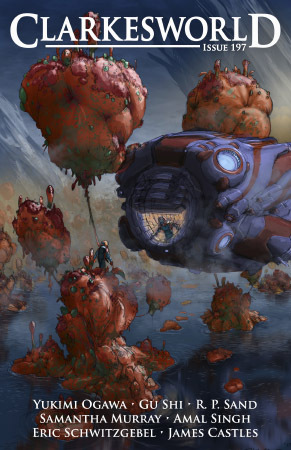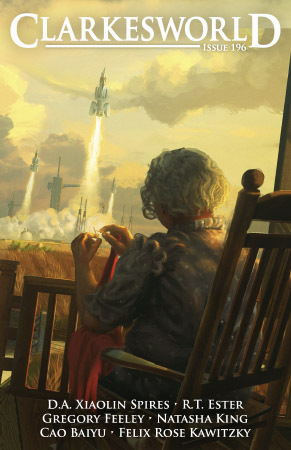Rachel S. Cordasco's Blog, page 11
May 3, 2023
Out This Month: May
SHORT STORIES
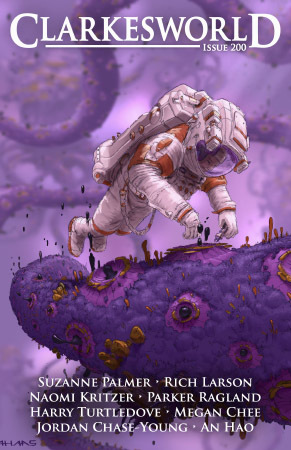
“Action at a Distance” by An Hao, translated from the Chinese by Andy Dudak (Clarkesworld, May 1).
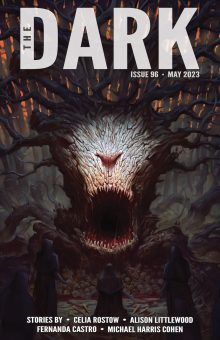
“The Inside is Always Entrails” by Fernanda Castro, translated from the Portuguese by H. Pueyo (The Dark, May 1).
NOVELS

The Roamers by Francesco Verso, translated from the Italian by Jennifer Delare (Flame Tree Press, May 9).
The pulldogs, a group of people at the twilight of Western civilisation, undergo an anthropological transformation caused by the dissemination of nanites (nanorobots capable of assembling molecules to create matter). This technology changes the way they eat and gives rise to a culture which, while reminiscent of an ancient nomadic society, is creative and new. Liberation from the imperative of food, combined with the ability to 3D print objects and use cloud computing, makes it possible for the pulldogs to make a choice that seems impossible and anachronistic – a new life, but is it really an Arcadia?
April 15, 2023
Review: Youth Without Youth by Mircea Eliade

translated by Mac Linscott Ricketts
original publication (in Romanian): 1978-79
first English edition: 1988
grab a copy here or through your local independent bookstore or library
I’ve been intrigued by Mircea Eliade (1907-1986), the Romanian writer, philosopher, and historian, ever since I dedicated a month to Romanian SFT back in 2021. From what I know about Eliade, he pursued truth wherever it led him and was deeply interested in history, religion, philosophy, and the nature of narrative.
My edition of Youth Without Youth includes a foreword by filmmaker Francis Ford Coppola, who turned this slim novel into a film a couple of decades ago (it’s now on my watchlist). I’m not surprised that this story about rejuvenation, reincarnation, immortality, Nazi occult research, and knowledge of various kinds would attract the attention of someone like Coppola. And yet, Eliade is virtually unknown in America–even among those of us who regularly read SFT.
Youth Without Youth reminds me of Huxley’s Brave New World in that both are such novels of ideas that character development takes a backseat. The main character in Eliade’s book, though, is a bit more real–he has a rich inner life…ok, inner lives, since the lightning that struck him seems to have implanted another consciousness in his mind.
To explain: Dominic Matei is standing on a street corner in Bucharest on the night before Easter, 1938, ready to cross the street, when he is suddenly struck by lightning. According to the doctors and nurses at the hospital to which he’s taken, Dominic should have died. The burns all over his body and the fact that the lightning struck him directly on the head both suggest that Dominic is beyond lucky to still be alive.
As he recovers in the hospital, Dominic starts regenerating: his teeth fall out and new teeth grow in. He looks no older than thirty, and suddenly he can remember many of his favorite poems and philosophy texts. Even stranger, he is able to read in several languages, including Chinese and Albanian, despite having barely studied them in the past.
And then there’s that other voice in his head, which explains to Dominic that he can do now what he never thought possible–pursue his research and write his book without worrying about creeping dementia and physical deterioration. Unfortunately, the Nazis are on the lookout for people like Dominic, who can help them in their occult research. After all, if Dominic is the key to understanding rejuvenation and regeneration via electricity…well, many characters around Dominic know that that kind of knowledge should never fall into Nazi hands.
Dominic is smuggled into Switzerland and lives the rest of his long life traveling around the world, at one point living with a young German woman in India. Dominic helps this woman through the revelation that she shares a consciousness with a centuries-old female ascetic and master of Sanskrit writings.
One of the major, and very interesting, questions raised by the novel is this: what are the ethics of scientific experimentation when the goal is the evolution of human consciousness and knowledge? Many characters in the novel agree that the Nazis shouldn’t electrocute people in order to learn more about regeneration, but the doctors who treat Dominic conduct their own kind of experimentation, spending a lot of time asking him questions and trying to understand what happened to him. Another character declares that understanding regeneration is more important than the lives of individuals. Dominic, though, believes that he has been given a second chance to pursue knowledge, and that this is not something that can be shared with others. His experience with the German woman underscores this point–that only a small number of people are given this chance.
Eliade invites us to view Dominic within the Christian tradition by having him struck down on the night before Easter and then rejuvenate over the following weeks. What does it mean that Dominic, an aging, forgetful professor, is a kind of Christ figure? Does he have a responsibility to humankind or should he just enjoy his luck?
Youth Without Youth is a short but fascinating novel. Highly recommended.
April 1, 2023
Out This Month: April
SHORT STORIES
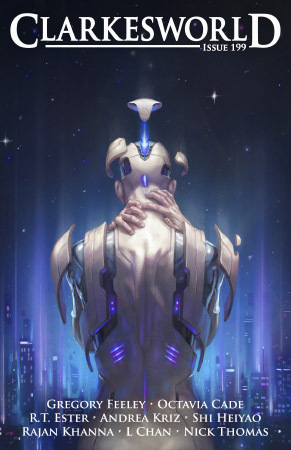 “The Librarian and the Robot” by Shi Heiyao, translated from the Chinese by Andy Dudak (Clarkesworld, April 1)COLLECTION
“The Librarian and the Robot” by Shi Heiyao, translated from the Chinese by Andy Dudak (Clarkesworld, April 1)COLLECTION
No Edges: Swahili Stories by various authors and translators (Two Lines Press, April 11).
Swahili is the future. The first collection of Swahili fiction in English translation, No Edges introduces eight East African writers from Tanzania and Kenya as they share tales of sorcerers, Nairobi junkyards, cross-country bus rides, and spaceships that blast prisoners into eternity. Here we’re encouraged to explore the chaos of life on a crowded Earth, as well as the otherworldly realms lying just beyond our reach. Through language bursting with rhythm and vivid African futurist visions, these writers summon the boundless future into being.
“Out This Month: April”
SHORT STORIES
 “The Librarian and the Robot” by Shi Heiyao, translated from the Chinese by Andy Dudak (Clarkesworld, April 1)COLLECTION
“The Librarian and the Robot” by Shi Heiyao, translated from the Chinese by Andy Dudak (Clarkesworld, April 1)COLLECTION
No Edges: Swahili Stories by various authors and translators (Two Lines Press, April 11).
Swahili is the future. The first collection of Swahili fiction in English translation, No Edges introduces eight East African writers from Tanzania and Kenya as they share tales of sorcerers, Nairobi junkyards, cross-country bus rides, and spaceships that blast prisoners into eternity. Here we’re encouraged to explore the chaos of life on a crowded Earth, as well as the otherworldly realms lying just beyond our reach. Through language bursting with rhythm and vivid African futurist visions, these writers summon the boundless future into being.
March 5, 2023
Out This Month: March
SHORT STORIES

“The Errata” by K. A. Teryna, translated from the Russian by Alex Shvartsman (Asimov’s, March/April).

“Incommunicado” by Andrej Kokoulin, translated from the Russian by Alex Shvartsman (Analog, March/April).
NOVELS
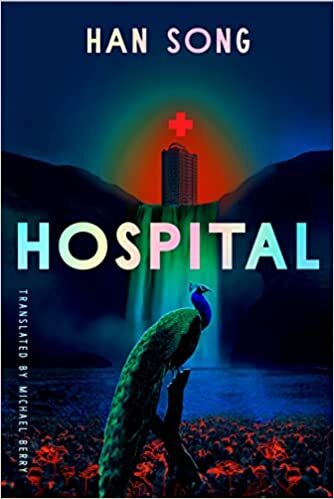
Hospital by Han Song, translated from the Chinese by Michael Berry (AmazonCrossing, March 1)
A twisted, wildly imaginative tale of one man’s mysterious illness and his journey through a dystopian hospital system. When Yang Wei travels to C City for work, he expects nothing more than a standard business trip. A break from his day-to-day routine, a good paycheck, a nice hotel―nothing too extravagant, of course. No fuss, but all the amenities. But this is where his problems begin. A complimentary bottle of mineral water from the hotel minibar results in sudden and debilitating stomach pain, followed by unconsciousness. When he wakes three days later, things don’t improve; they get worse. With no explanation, the hotel forcibly sends him to a hospital for examination. There, he receives no diagnosis, no discharge date…just a diligent guide to the labyrinthine medical system he’s now circulating through. Armed with nothing but his own confusion, Yang Wei travels deeper into the inner workings of the hospital and the secrets it’s hiding from the patients. As he seeks escape and answers, one man’s illness takes him on a quest through a corrupt system and his own troubled mind.
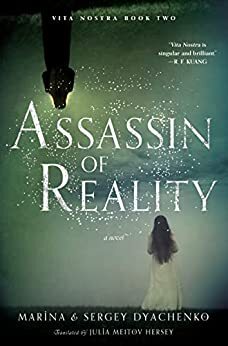
Assassin of Reality by Marina and Sergey Dyachenko, translated from the Russian by Julia Meitov Hersey (Harper Voyager, March 14)
The eagerly anticipated sequel to the highly acclaimed Vita Nostra takes readers to the next stage in Sasha Samokhina’s journey in a richly imagined world of dark academia in which grammar is magic—and not all magic is good. In Vita Nostra, Sasha Samokhina, a third-year student at the Institute of Special Technologies, was in the middle of taking the final exam that would transform her into a part of the Great Speech. After defying her teachers’ expectations, Sasha emerges from the exam as Password, a unique and powerful part of speech. Accomplished and ready to embrace her new role, she soon learns her powers threaten the old world, and despite her hard work, Sasha is set to fail. However, Farit Kozhennikov, Sasha’s dark mentor, finds a way to bring her out of the oblivion and back to the Institute for his own selfish purposes. Subsequently, Sasha must correct her mistakes before she is allowed to graduate and is forced to do what few are asked and even less achieve: to succeed and reverberate—becoming a part of the Great Speech and being one of the special few who dictate reality. If she fails, she faces a fate far worse than death: the choice is hers. Years have passed around the Institute—and the numerous realities that have spread from Sasha’s first failure—but it is only her fourth year of learning what role she will play in shaping the world. Her teachers despise and fear her, her classmates distrust her, and a growing love—for a young pilot with no affiliation to the school—is fraught because a relationship means leverage, and Farit won’t hesitate to use it against her. Planes crash all the time. Which means Sasha needs to rewrite the world so that can’t happen…or fail for good.
February 23, 2023
New Lyuben Dilov Translation
[image error]Translator Andy Erbschloe is making Bulgarian speculative fiction author Lyuben Dilov available to English-language readers! Check out the latest translation of Unfinished Novel of a Student (1986):
From the Introduction:
“… Dilov did address the hypocrisies and excesses of the West, but he himself was a non-partisan and went to great pains in his work to show partiality only to compassion and virtue, as understood by a youth, not an ideologue. Like much of Dilov’s writing, themes of pride, guilt, and justification are discoursed over ample alcohol.
But while the thrust of his arguments is universal and communal, the Bulgarian setting of this novel is more than merely a substrate. This piece roars its Bulgarian expression…
…some parts of this book are set in Bulgaria, some in the asteroid belt of the 24th century. In CHAPTER 7 we are taken into the Labyrinth via an elegantly framed, demythologizing, super spy adventure story. The “real” Labyrinth was solved using a thread from Ariadne, a detail with symbolic value for which the author doesn’t fail to account. Because Dilov, rather than telling the future facing forward, follows the threads back through the endless maze of tragic lies that brought us here, and reminds us that we’ll be looking back on them just as endlessly when the future arrives.
So enjoy this foray into distant lands and distant times, as Dilov brews his subtle heuristic flavors from esoteric spice and the traditional medicines of the Bulgarian spirit(s). The rest is drawn from the well of a perennial philosophy so I’m sure you’ll catch on…”
February 18, 2023
Clelia Farris
Clelia Farris won the Fantascienza.com Award with the novel Rupes Recta, printed by Delos Books; she won the Odissea Award with the novel Nessun uomo è mio fratello and the Kipple Award with the novel La pesatura dell’anima, setting in a uchronic Egypt. In 2012 Kipple Edizioni published the novel La giustizia di Iside. She was a finalist for the Urania Award, the most important Italian award for science-fiction, with the novel Necrospirante. Clelia lives in Cagliari, Sardinia, Italy, and she writes full time.
Clelia’s works in English translation are listed below:
COLLECTIONS
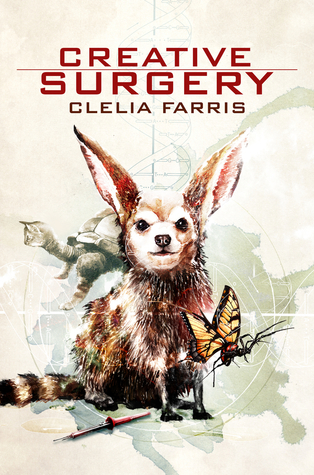
Creative Surgery, translated by Rachel Cordasco and Jennifer Delare (Rosarium Publishing, 2020).
In these mind-bending tales, you’ll find captivating characters with elusive identities like Kieser, who longs to transform himself through horrific procedures in “Creative Surgery;” or Yuliano (“Secret Enemy”), a man with no aesthetic taste; or Gabola, engaged in the battle of a lifetime against the expropriation of the Little Tuvu Hill. With dry and polished prose, like the stones of her native Sardinia, Clelia Farris takes us on adventures among the ruins of a future marred by climate change (“A Day to Remember”) and in a haunting prison inhabited by the enigmatic figure of “Rebecca.” Collected and translated into English for the first time, these seven stories represent some of the greatest works from one of Italy’s best science fiction authors.
SHORT STORIES
“A Day to Remember” (Samovar Magazine, 2017)
In a world that is now mostly underwater, one woman helps her friends and neighbors alter their memories.
“The Substance of Ideas” (Future Science Fiction Digest, 2018)
Two friends living on a kibbutz discover a hidden cache of sea urchins that, when eaten, make people go mad.
“Holes” (World Literature Today, 2019)
A self-aware AI attempts to become human.
“Another Place” (Samovar Magazine, 2021)
Stuck in a timeless, placeless limbo, two sometime-lovers conduct an experiment to break free.
“The Words” (Apex Magazine, 2022)
The twin daughters of famous physicists travel back in time to save Anne Frank.
February 4, 2023
Out This Month: February
“Introduction to 2181 Overture, Second Edition” by Gu Shi, translated from the Chinese by Emily Jin (Clarkesworld, February 1)
NOVELS
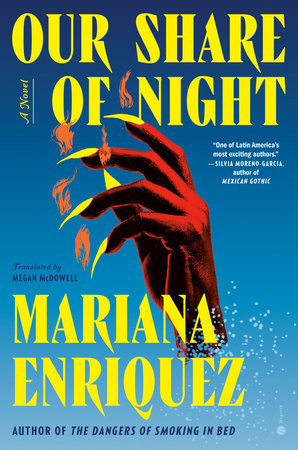 Our Share of Night
by Mariana Enriquez, translated from the Spanish by Megan McDowell (Hogarth, February 7)
Our Share of Night
by Mariana Enriquez, translated from the Spanish by Megan McDowell (Hogarth, February 7)
A young father and son set out on a road trip, devastated by the death of the wife and mother they both loved. United in grief, the pair travel to her ancestral home, where they must confront the terrifying legacy she has bequeathed: a family called the Order that commits unspeakable acts in search of immortality. For Gaspar, the son, this maniacal cult is his destiny. As the Order tries to pull him into their evil, he and his father take flight, attempting to outrun a powerful clan that will do anything to ensure its own survival. But how far will Gaspar’s father go to protect his child? And can anyone escape their fate? Moving back and forth in time, from London in the swinging 1960s to the brutal years of Argentina’s military dictatorship and its turbulent aftermath, Our Share of Night is a novel like no other: a family story, a ghost story, a story of the occult and the supernatural, a book about the complexities of love and longing with queer subplots and themes.
 The Strangers
by Jon Bilbao, translated from the Spanish by Katie Whittemore (Dalkey Archive, February 21).
The Strangers
by Jon Bilbao, translated from the Spanish by Katie Whittemore (Dalkey Archive, February 21).
A Spanish-gothic version of a Patricia Highsmith novel
Jon and Katharina spend the winter in Jon’s childhood home on the Cantabrian coast, lonely and bored, ambivalent about their precarious freelance jobs and disconnected in their relationship. Yet the couple’s routine will soon be disturbed when one rainy night, they witness strange lights in the sky over the village. The next morning, ufologists begin to arrive in the village, anxious to make extraterrestrial contact. The morning brings other unexpected guests: Jon’s distant cousin, Markel, and his companion, the silent, alluring Virginia. The visit becomes increasingly uncomfortable as—like the ufologists camped out in view of the house—the strangers stay on and show little sign of planning to leave. Days stretch into weeks, even as the cousins can’t remember ever having met, Virginia’s behavior becomes subtly threatening, and Jon begins doubt that Markel is who he says he . . . A deliciously tense and darkly humorous novella that explores the border that separates love from routine and offers a twist on theme of “the other” and how to live with the unknown, The Strangers introduces English readers to singular talent.
January 7, 2023
Out This Month: January
“Zhuangzi’s Dream” by Cao Baiyu, translated from the Chinese by Stella Jiayue Zhu (Clarkesworld, January 1)
REVIEWS
Review: The Erinys Incident by Tani Kōshū
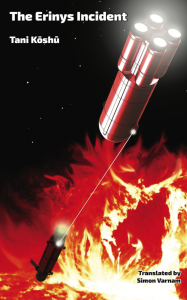 translat
ed from the Japanese by Simon Varnum
translat
ed from the Japanese by Simon Varnum
original edition: 1983
translated edition: Kurodahan Press, 2018
grab a copy here or through your local independent bookstore or library
Reading The Erinys Incident reminded me that I’m still quite upset about the publisher Kurodahan shutting down. For decades, Kurodahan gave us Anglophone readers a wonderful selection of Japanese speculative fiction, including the important Speculative Japan anthology series, Kthulhu Reich, Bullseye!, and much more.
Tani’s Erinys is about the hardest kind of hard sf you could ask for (think Liu’s Three-Body Trilogy or Dukaj’s The Old Axolotl). As per the title, this relatively near-future novel focuses on an incident stemming from the recently-concluded Outer Planet Revolt between the inner and outer planets. As we learn about the conspiracy of Outer Planet Alliance (OPA) operatives to take over a minor port city, Tani engages in in-depth explanations of space ship engineering, planetary rotation and orbit, and the delicate nature of slingshotting around the sun.
Readers are quickly introduced to the various inhabitants of Port Erinys, located on the eponymous moon of Uranus. Included in this motley crew are cyborgs, civilians, OPA operatives, engineers, and others displaced by the Revolt. Jumping between the icy boroughs of the cyborgs on Port Erinys to a space battle between the OPA and the AeroSpaceFleet (inner planets), Tani reveals the competing incentives that drive the main characters. Og, a cyborg who willingly went to Port Erinys, exiled himself because of his traumatic injuries sustained during the Revolt; Jamna, a quiet, brilliant, and deadly OPA operative, has made it her mission to help the OPA take Erinys and declare it independent of the ASF. Inspector Lopez tries to keep the peace in the port city between the sometimes competing factions of workers and exiles while making the bumbling mayor think he himself is in charge. These are just a few of the fascinating characters in Tani’s tale.
While Tani leads us to think that the coming revolt on Erinys is the main action of the story, we find out only at the end that Erinys is actually part of a much larger plan. In fact, the solar system is planning for a future war with a hostile alien species discovered by one of the recent ASF extrasolar expeditions. Like Yoshiki Tanaka’s Legend of the Galactic Heroes series (published in Japan around the same time as Erinys), Tani’s novel is action-packed, technology-heavy, and never boring. Once again, we have here an excellent work of Japanese SFT that enriches the genre.

